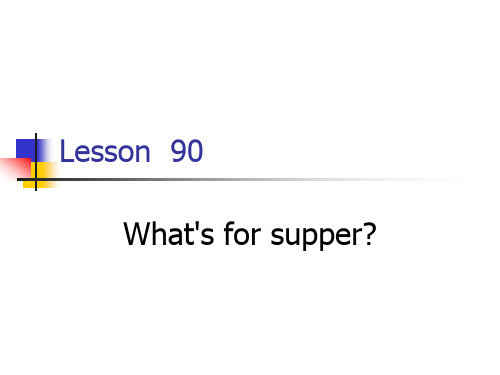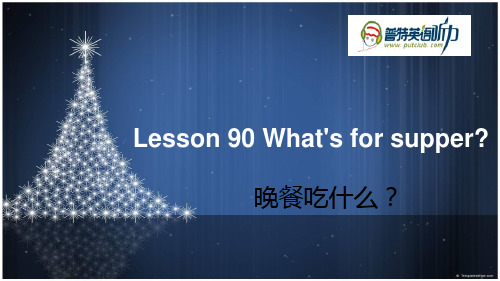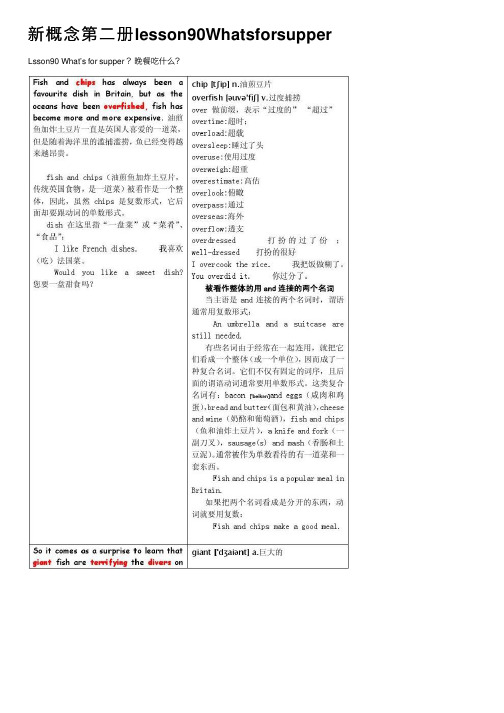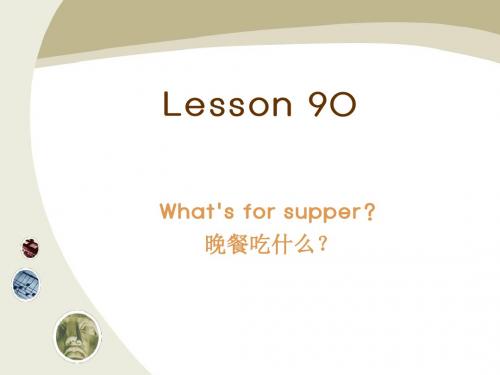新概念英语第二册第90课课件
新概念第二册90课课件

• Oil rigs have to be repaired frequently and divers, who often have to work in darkness a hundred feet under water, have been frightened out of their wits by giant fish bumping into them as they work.
• He has quick wits . • 他在紧急情况中缺少临机应变的能力。
• He lacked the wits to see what to do in the emergency .
• (2) 机智、聪明(u) • 他的演讲充滿了机智和幽默。
• His speech was full of wit and humor . • live by one’s wits 靠小聪明过日子 • out of one’s wits 失去理智
• North Sea 北海 • it comes as a surprise + to do sth. /that 某
事令人惊讶
• It comes as a surprise that it rains/snows.
• It comes as a surprise to have four lessons in three hours.
• 2.Why has fish become more and more expensive?
• 3.What do divers do on oil rigs? • 4.Where do they often work? • 5.What do they use to protect them? • 6.What type of fish are they? • 7.How big are the fish?
新概念第九十课课件

listen
• Listen to the tape and then answer the question. • How is Emma? • 听力指导: • 听前先浏览题目,抓住关键词,静心听听 力,以寻求正确答案。
(模仿跟读) 1. Pay attention to the pronunciation and intonation. (注意语音语调) 2. Pay attention to the new words and expressions. (注意新单词和句型)
学习目标
Knowledge aim: 1. 熟记Ls9-10单词 2. 听懂并会运用how询问身体状况. 3. 正确使用be动词 Ability aim: 能够准确说明自己及他人的身体状况。 Feeling aim: 关爱他人;激情投入,享受用英语表达的快乐。
你平时是怎样问候别人的呢?
上节课我们学习了什么?
Read the dialogue in groups.
(小组内分角色朗读与背诵)
1. 特别注意文中含有问好以及表述身体状
况的句子,观察其特点;
2. 大声朗读,培养语感,试着背诵短文。
要求:1. 准确运用Lessons1-10所学。 2. 学以致用,展开想象,看谁表演最精彩。
Have a summary (总结评价)
1.形容词性物主代词、名词性物主 代词的什么区别和联系。 2.主格和宾格的区别和联系。
be妈妈嫁女:be氏三姐妹
• • • • be氏三朵花, am, is还有are, 我(I)恋am, 你(you)恋are, is跟了他(he)她(she)它(it), 单娶is, 复娶are。
什么是单?什么是复?
• 二、在下面的题目中填上恰当的Be动词。 • 1. I ________from Australia. 2. She _______ a student. 3. Jane and Tom _________my friends. 4. My parents _______very busy every day. 5. I _______ at school. 6. My brother ________ at school. 7. We ________ students. 8. They ________ from China. 9. Yang Ling ________ eleven years old. 10. Where ________ your friends? 12. Which dog ________ yours?
新概念英语第二册Lesson90课(共22张PPT)

Honesty is one factor for his success . (2) n. 因數、因子
★ crew n.(船、飛機、火車等的) 全体工作 人员(集體名詞)
工作人員很多。
The crew is large . 全體機組人員總共是30個。
★ diver n. 潜小员、跳水選手 dive n./ vi.跳水,潛水;俯沖,撲 從橋上跳入河中 dive from the bridge into the river dive for (為尋找或取……) 潛水 他們潛水去撈牡蠣 They dived down for oysters . dive into (突然)投入, 跳入、潛心研究 他潛心研究中國的歷史。 He dived into the history of China .
He is the giant in the field of electronics.
★ terrify
v. 吓,使恐怖、使受驚嚇
terrify sb 惊吓某人、威胁(某人)
他的突然出現,嚇壞了他們。
His sudden appearance terrified them .
be terrified of 害怕 ..., 恐惧...
Fish and chips has always been a favorite dish in Britain, but as the oceans have been overfished, fish has become more and more expensive.
fish and chips 油煎鱼加炸土豆片 ,英国的一種 家常菜,被看做是一盤菜,因此用單數動詞
新概念英语二册---L90

There is a big problem for divers. They are frightened out of their wits by giant fish. How to solve the problem? What kind of fish are they?
shark
skate cod
crispy/'krispi/ 酥脆的
Bangers and mash
This dish is described as the“working class hero's meal”. “Banger” are pork sausages and “mash” is short for mashed potatoes.
Yorkshire/jɔ:kʃə/ 约克郡 (in the northeast of England)
scones
Britain isn't Britain without tea,
and tea isn't tea without scones.
scone/skəun/ 司康饼 a small round cake, sometimes with dried fruit in it and often eaten with butter,jam and cream spread on it.
They are favouite eating varieties like cod and skate which have grown to unusual sizes.
What was the factors that caused the giant fish?
1. Warm water 2. The plentiful supply of food. 3. The total absence of fishing boats.
新概念二 90 AntAngelia

terrify
fill with terror or fear 雷声把这个孩子吓坏了。
The thunder terrified the child.
她怕蛇。
那小女孩被闪电吓坏了。
She was terrified of snakes.
The little girl was terrified by lightning. terrify
I'm afraid I am causing you much trouble. I'm afraid I am causing much t.
那个女孩从船上掉入水中淹死了。
The girl fell overboard and drowned. Many passengers threw wastes overboard and they were fined.
What's for supper?
Lesson 90
• chip n. 油煎土豆片 • overfish v. 过度捕捞 • giant adj. 巨大的 • terrify v. 吓,使恐怖
• shark n. 鲨鱼 • whale n. 鲸 • variety n. 品种 • cod n. 鳕 • skate n. 鳐 • factor n. 因素 • crew n. 全体工作人员
1. Oil rigs have to be repaired frequentyly. 2. They have had the oil rigs repaired continuously. Special cages have been made to protect the divers from these monsters.
新概念二Lesson 90(共38张PPT)-精品课件

观众们越来越兴奋。
The audience got more and more excited . 越来越多的医生使用这种新药。
More and more doctors have begun to use the new medicine.
1. be frightened out of one's wits 被吓昏了,被吓得
dive for (为寻找或取……)潜水
它潜水去捞鱼。It dived down for fish .
dive into (突然)投入, 跳入、潜心研究
他潜心研究电脑游戏。 He dived into the computer games.
★ wit
n.(复数) 理智,头脑 他反应敏锐He has quick wits.
fish and chips 油煎鱼加炸土豆片,英国的一种家常菜, 被看做是一盘菜,因此用单数动词。 用and相连的名词看成是一个整体时,谓语动词用单数形 式;如果把他们看成分开的部分,动词就用复数形式。
Fish and chips has always been a favorite dish in Britain, but as the oceans have been overfished, fish has become more and more expensive. 比较级+比较级“越来越...”
closed season
★ giant
1) adj. 巨大的 一个大公司 a giant corporation 2) n.(故事或传说等)巨人、大汉 杰克看到巨人爬下豆茎。 Jack saw the giant climbing down the beanstalk. 3) n.伟人、大人物 他是电子行业的大人物。 He is the giant in the field of electronics.
新概念英语第二册第90课课件

• 2)有些名词由于经常在一起连用,人们已 把它们看成一个整体(或一个单位),因 而成了一种复合名词。它们不仅有固定的 词序,且后面的谓语动词通常要用单数形 式。
• • • • • • •
这类复合名词包括 bacon and eggs(咸肉和鸡蛋), bread and butter(面包和黄油), cheese and wine(奶酪和葡萄酒), fish and chips(鱼和油炸土豆片), a knife and fork(一副刀叉), sausage (s) and mash(香肠和土豆泥)。
• • • • •
Fish and chips is a popular meal in Britain. 鱼和炸土豆片在英国是颇受欢迎的食品。 Bacon and eggs is my favourite dish. 咸肉和鸡蛋是我爱吃的一道菜。 但是,如果我们把这两个名词看成是分开 的东西,动词就要用复数: • Fish and chips make a good meal. • 鱼和炸土豆片就是一顿美餐。 • 因此,谓语动词在这些名词后面究竟用单 数还是复数形式还需要看具体情况。
• 2.…divers…have been frightened out of their wits by giant fish bumping into them as they work.……潜水员……曾在工作时被撞到 他们身上的大鱼吓得惊慌失措。 • as在这里相当于when或while • (1)out of one's wits表示“失去理智”、“惊 慌失措”: • She was frightened out of her wits by the great fire. • 大火吓得她惊慌失措。 • Are you out of your wits? • 你疯了吗?
新概念二第90课课件

Oil rigs have to be repaired frequently and divers,who
定从
often have to work in darkness a hundred feet under water
被吓晕了
撞上
have been frightened out of their wits by giant fish bumping
结果是
the total absence of fishing boats around the oil rigs.As a result,The
fish just eat and eat and grow and grow in the lovely warm water.
谢谢聆听
A. a
B. an
C. /
D. the
中考链接
What ________ big fish!
A. a
B. an
C. /
D. the
giant
adj. 巨大的
a giant panda 大熊猫
diver
n. 潜水员
dive v.潜入
terrify
v. 吓,使恐怖 be terrified of 害怕 孩子们害怕被骂。 The children are terrified of being scolded . be terrified by / be terrified at 被...吓一跳
into them as they work.Now they have had special cages
made to protect them from these monsters. 保护...免于
新概念英语第二册Lesson90课件

江郎才尽
cage
n. 笼
shark
n. 鲨鱼
whale
n. 鲸
variety
cod
n. 鳕
skate
n. 鳐
factor
n. 因素 eg. The weather could be an important factor in tomorrow’s game. 天气情况会是明天比赛的一个重要因素
A. pickB. picked
C. picking
D. who picking
( A ) 8. The plentiful _______ of sunshine made the flowers grow well.
A. supply
B. space
C. subject
D. success
Part 3. Circle the correct answer.
1. The old _are______ (is / are) well looked after by the government in China.
2 . This pair of shoes __was_____ (was / were) made i n Nanjing.
3. Each of the students __has_____ (has / have) a Chinese-English dictionary.
( B ) 1. You’d better wear a pair of sunglasses to ______ ou ______ the sun.
A. suffer … from B. protect…from C. suffer…for
新概念二 lesson90 Mina桑

diver
• • • • • dive dive in(头朝下) 跳进水里 You dive in first . dive into 埋头于;跳进;钻进 dive into the river to save the kid.
• Now they have had special cages made to protect them from these monsters. • cage-cabbage
• The fish are not sharks or killer whales, but favourite eating varieties like cod and skate which grow to unnatural sizes, sometimes as much as twelve feet in length. • • • • shark whale cod skate
Hale Waihona Puke giant 巨大的• So it comes as a surprise to learn that giant fish are terrifying the divers on North Sea oil rigs. • gigantic巨大的 • The Incredible Hulk
New words and expressions 生词和短语
• As a result, the fish just eat and eat and grow and grow in the lovely warm water. Who eats who?
新概念第二册lesson90Whatsforsupper

新概念第⼆册lesson90Whatsforsupper Lsson90 What’s for supper ?晚餐吃什么?1 chip [t?ip] n.油煎⾖⽚_____________________________________________________2 overfish [?uv?'fi?] v.过度捕捞_____________________________________________3 giant ['d?ai?nt] a.巨⼤的___________________________________________________4 terrify ['terifai] v.吓,使恐怖_________________________________________________5 diver ['daiv?] n.潜⽔员______________________________________________________6 oil rig ['?il ?rig] ⽯油钻塔______________________________________________________7 wit[wit] n.(复数)理智,头脑__________________________________________________8 cage [keid?] n.笼______________________________________________________9 shark [?ɑ:k] n.鲨鱼______________________________________________________10 whale [weil] n.鲸______________________________________________________11 variety[v?'rai?ti] n.品种______________________________________________________12 cod [k?d] n.鳕______________________________________________________13 skate [skeit] n.鳐______________________________________________________14 factor ['f?kt?] n.因素______________________________________________________15 crew [kru:] n.全体⼯作⼈员___________________________________________________1 n.油煎⾖⽚_____________________________________________________2 v.过度捕捞_____________________________________________3 a.巨⼤的___________________________________________________4 v.吓,使恐怖_________________________________________________5 n.潜⽔员______________________________________________________6 ⽯油钻塔______________________________________________________7 n.(复数)理智,头脑__________________________________________________ 8n.笼______________________________________________________9n.鲨鱼______________________________________________________10n.鲸______________________________________________________11 n.品种______________________________________________________12 n.鳕______________________________________________________13 n.鳐______________________________________________________14n.因素______________________________________________________15 n.全体⼯作⼈员___________________________________________________ overdressed 打扮的过了份well-dressed 打扮的很好bacon ['beik?n]and eggs(咸⾁和鸡蛋)bread and butter(⾯包和黄油)cheese and wine(奶酪和葡萄酒)fish and chips(鱼和油炸⼟⾖⽚):可以看作是单数也可以看作是两种不同的东西a knife and fork(⼀副⼑叉)sausage(s) and mash(⾹肠和⼟⾖泥)fear/be afraid of 害怕……(主语是⼈)out of one's wits “失去理智”,”惊惶失措”beat sb. to mummy 打个半死,失去理智,惊慌失措bump into :①碰上,撞上②偶然遇见,碰见(多⽤于⼝语)variety show 综艺节⽬various = all kinds of adj. 各种各样的grow to 长到as much as 像……⼀样(最⼤限度)+ 数字absence of 缺少,不存在total absence of…完全没有……total absence of mind ⼼不在焉the total absence of order… 没有秩序as a result = so 结果是,因此as a result of = because of因为……;作为......的结果。
新概念英语NCE2_Lesson90(共28页)课件

★ giant (1) adj. 巨大的 a giant corporation 一个大公司 giant panda n. 大熊猫
(2)n. (故事或传说等) 巨人、大汉 (3) n. 伟人、大人物
• ★ terrify v. 吓,使恐怖、使受惊吓
• be terrified of 害怕 ..., 恐怖 • terrify sb 惊吓某人、威胁(某人) • be terrified by / be terrified at • 被……吓一跳
• 油煎鱼加炸土豆片一直是英国人喜爱的一道菜, 但是随着海洋里的滥捕滥捞,鱼已经变得越来 越昂贵。
• ※ fish and chips 油煎鱼加炸土豆片 , 英国的一种家常菜,被看做是一盘菜,因 此用单数
• 用and 相连的名词看成一个整体时,谓语 动词用单数形式;如果把他们看成分开的 部分,动词就用复数形式
• in comedy • be present at the meeting • a long queue of • even if • be pleased with • it is adj. for sb to do sth • get around • Need not have done本没必要做… • at the beginning of
• (2) 机智、聪明(u)
• at one’s wits’ end 智穷计尽 • have one’s wits about • = keep one’s wits about • 头脑冷静;保持警觉;精明;足智多谋
• out of one’s wits 失去理智
• ★ variety [vəˈraiəti] n. 品种,多样化
as long as what which whether even though
新概念英语第二册Lesson 90 (共60张PPT)

Comprehension questions
What's terrifying the divers? Giant fish are.
Comprehension questions
Is this a surprise? Yes, it is.
Comprehension questions
What do divers do on oil rigs? Carry out repairs.
terrify out of one’s wits 被吓昏了
New words and expressions
The pupils were __te_r_r_if_ie_d__ out of their wits.
GRAMMAR
Grammar
He has a new house. He has got a new house. (KS18) I had a walk in the garden. (KS42) He wanted to have a drink of water. (KS42) He had his hair cut yesterday. (KS66)
Understand the situation
T: What do you think is happening in the picture?
Listening objective
•T : What kind of fish are they? •Answer : They are favourite eating varieties like cod and skate which have grown to unnatural sizes.
Grammar
新概念二第90课PPT解读

★ • • • • • • • • • • • • • • •
variety [vəˈraiəti] n. 多樣化 ←→monotony [məˈnɔtəni] n.單調 a life full of variety 豐富多彩的生活 for variety’s sake 為不單調起見,為了有所變化 a variety of 種種,多種多樣的 eg:There are a wide variety of people on the earth . 地球上有各種不同的人。 variety show (英)綜藝節目 variety store (美) 雜貨店(以低價出售日常品及其他雜貨的店鋪) various adj.(1) 形形色色的、種種的 representatives from various countries 來自各國的代表 various experiences 種種經驗 (2) 許多的、好幾個的(無比較級的變化) for various reasons 因種種理由 variation [ˌveəriˈeiʃən] n.變化,變動;變體,變種;變奏(曲) variations of temperature 溫度的變化
★ crew n.(船、飛機、火車等的) 全体工作人员(集體名詞) • eg:The crew is large . 工作人員很多。 • eg:The crew of the jet are 30 in all . • 全體機組人員總共是30個。 • eg:The plane had seventy passengers and a crew of ten . 這架飛機有七十名乘客,10名機組人員。 • crew cut 小平頭 ; crew neck 圓領毛衣
Words study
新概念二Lesson 90

• have been frightened out of their wits by giant fish bumping into them as they work.
• Now they have had special cages made to protect them fr0 What's for supper?
• What kind of fish are they?
• Fish and chips has always been a favourite dish in Britain,
• but as the oceans have been overfished, fish has become more and more expensive.
• So it comes as a surprise to learn
• that giant fish are terrifying the divers on North Sea oil rigs.
• Oil rigs have to be repaired frequently • and divers, who often have to work in darkness a hundred feet under water,
• The fish are not sharks or killer whales, but favourite eating varieties like cod and skate
• which grow to unnatural sizes, sometimes as much as twelve feet in length.
• As a result, the fish just eat and eat and grow and grow in the lovely warm water. • Who eats who?
- 1、下载文档前请自行甄别文档内容的完整性,平台不提供额外的编辑、内容补充、找答案等附加服务。
- 2、"仅部分预览"的文档,不可在线预览部分如存在完整性等问题,可反馈申请退款(可完整预览的文档不适用该条件!)。
- 3、如文档侵犯您的权益,请联系客服反馈,我们会尽快为您处理(人工客服工作时间:9:00-18:30)。
• (2)专门的,特制的,专用的:
• Special cages are made to protect them from giant fish.
• 为了保护他们免受大鱼的侵袭,人们做了 特制的笼子。
• A special railway line will be built for the Olympic Games.
单数形式
• dish在这里指“一盘菜”或“菜肴”、“食 品”:
• I like French dishes. • 我喜欢(吃)法国菜。
• Would you like a sweet dish? • 您要一盘甜食吗?
• 2.…divers…have been frightened out of their wits by giant fish bumping into them as they work.……潜水员……曾在工作时被撞到 他们身上的大鱼吓得惊慌失措。
• Fish and chips make a good meal. • 鱼和炸土豆片就是一顿美餐。 • 因此,谓语动词在这些名词后面究竟用单
数还是复数形式还需要看具体情况。
放映结束 感谢各位批评指导!
谢 谢!
让我们共同进步
Lesson 90 What's for supper?
晚餐吃什么?
• 1.Fish and chips has always been a favourite dish in Britain…
• 油煎鱼加炸土豆片一直是英国人喜爱的一道菜……
• fish and chips被看做是一个整体,因此, • 虽然chips是复数形式,它后面却要跟动词的
• Fish and chips is a popular meal in Britain. • 鱼和炸土豆片在英国是颇受欢迎的食品。
• Bacon and eggs is my favourite dish. • 咸肉和鸡蛋是我爱吃的一道菜。 • 但是,如果我们把这两个名词看成是分开
的东西,动词就要用复数:
• 4.favourite eating varieties, 深受人们喜 爱的食用的品种。
• eating在这里为形容词, • 表示“供食用的”,它有时也表示“宜生
食的”:
• Eating corn is quite sweet. • 食用玉米很香甜。
• These are eating apples, and those are cooking apples/ones.
• 他没有用功学数学。因此,他考试没及格。
• My husband spent weeks training our dog to press its paw on the latch. As a result, it has become an expert at opening the gate.
• 为了奥运会,人们将修筑一条铁路专线。
• 2.用and连接的两个名词 • (1)当主语是and连接的两个名词时,谓
语通常用复数形式:
• Jane and Bill have got married last week. • 简和比尔于上星期结了婚。
• An umbrella and a suitcase are still needed.
• I bumped into Jane at the conference. • 我开会时碰见了简。
• 3.Now they have had special cages made to protect them from these monsters.
• 现在他们有了特制的笼子,用来保护他们免受 大鱼的侵袭。
• (2)absence of表示“缺少”、“不存 在”:
• These plants don't grow well because of the absence of rain/sunshine.
• 由于缺乏雨水/阳光,这些植物长得不好。
• 6.as a result,结果,因此。
• He didn't work hard at mathematics. As a result, he failed in the examination.
• as在这里相当于when或while • (1)out of one's wits表示“失去理智”、“惊
慌失措”:
• She was frightened out of her wits by the great fire.
of your wits? • 你疯了吗?
• 还需要一把伞和一只手提箱。
• 2)有些名词由于经常在一起连用,人们已 把它们看成一个整体(或一个单位),因 而成了一种复合名词。它们不仅有固定的 词序,且后面的谓语动词通常要用单数形 式。
• 这类复合名词包括 • bacon and eggs(咸肉和鸡蛋), • bread and butter(面包和黄油), • cheese and wine(奶酪和葡萄酒), • fish and chips(鱼和油炸土豆片), • a knife and fork(一副刀叉), • sausage (s) and mash(香肠和土豆泥)。
• (2)bump into的含义之一是“碰上”、 “撞上”:
• Wandering in darkness, the drunk bumped into a policeman.
• 那醉汉在黑夜中闲荡时撞到了一个警察的 身上。
• bump into也可以表示“偶然遇见”、“碰 见”(多用于口语):
• (1)have had…made • 是使役式的完成式 • (2)protect经常与from或against连用:
• He tried to protect the child from the rain/the dog.
• 他试图使孩子不被雨淋/狗咬。
• This coat will protect you against the cold. • 这件大衣可以给你御寒。
• 这些是生吃的苹果,那些是烹任用的苹果。
• 5.the total absence of fishing boats around the oil rigs
• 钻井平台周围根本没有捕鱼船只。
• (1)total在这里表示“完全的”、“彻底 的”(相当于complete):
• His letter is a total surprise to her. • 他的来信完全出乎她的意料之外。 • That girl is a total stranger to me. • 我根本不认识那姑娘。
• 我丈夫花了几个星期的时间训练我们的狗 用脚爪按住门闩。结果,它现在成了开门 的专家。
• 词汇学习 Word study • 1.special adj. • (1)特殊的,特别的,独特的: • He received special care while in Paris. • 他在巴黎期间受到了特别照顾。 • He intends to send you a special gift on
